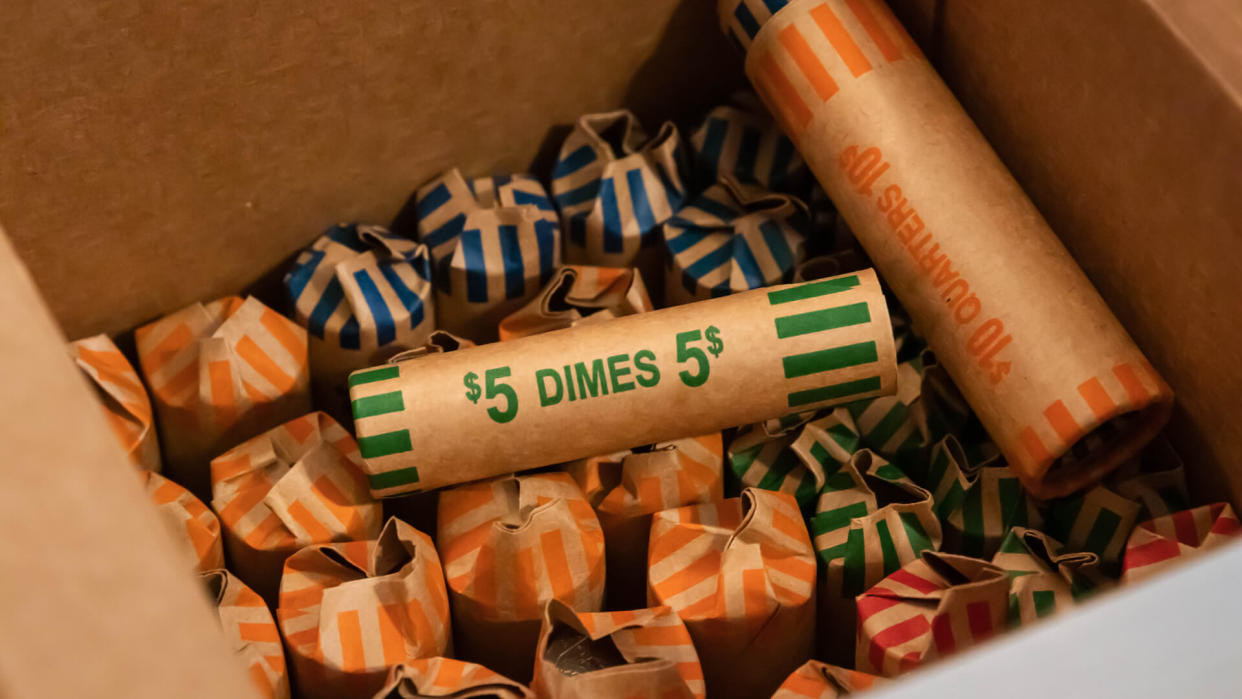I’m a Banking Expert: 5 Reasons To Not Ask Banks for Coins

While nearly all banks will exchange cash for rolled coins as a courtesy to their customers, you shouldn’t expect your local branch to turn your unprepared piggy bank into paper money. According to the Office of the Comptroller of the Currency, banks set their own internal policies regarding whether they accept unrolled coins for currency — and some of them will just say no.
Explore: 6 Rare Coins That Will Spike in Value in 2024
Visit: How To Get $340 Per Year in Cash Back on Gas and Other Things You Already Buy
But will financial institutions ever refuse to give coins in exchange for cash? Though rare, there are some instances where your teller might give you a hard time or even decline a request for coins. Here are five such reasons.
1. Supplies Are Limited
According to the Federal Reserve, “More than half of coins in the U.S. are sitting in consumers’ coin jars in their homes.”
That can make coins hard to come by at banks when there’s a shortage.
“Local branches sometimes have only a limited supply of coins and do not keep a surplus on-site,” said Niche Capital co-founder and chief revenue officer Dayten Rynsburger, a career banking industry veteran with experience ranging from credit management to mortgage banking. “If coins are needed, most local branches will have to make a special order for coins, which will delay your transaction.”
The most recent example was during the COVID-19 pandemic when a national coin shortage caused “a disruption at the most basic level of the U.S. currency system,” according to the Cato Institute.
Between 2020 and 2022, businesses that couldn’t make change had to turn away cash transactions. Banks were so drastically low on supply they couldn’t fulfill cash-for-coins requests from people and businesses.
Explore More: 10 of the Most Valuable Pennies
2. You Need an Unusually Large Volume
If you need to break a dollar — or even $10 or $20 — you shouldn’t have a problem. But don’t expect your teller to fulfill an unusually large request without prior notice, especially if they’re busy.
“Large orders for coin requests can burden tellers and slow down services of other bank customers,” said Rynsburger. “If you need a large order of coins, it’s best to call ahead of time so the local branch can have your coins on hand and wait for you to pick them up.”
3. You’re Looking for Collectibles or Rare Coins
Writing for The Spruce Crafts, American Numismatic Association member and expert Susan Headley explained that scouring unsearched bank-wrapped rolls of coins is an excellent way to mine for error coins or other rarities — but it’s not always easy to get the bank to comply.
Banks are in the business of making a profit, which they can’t do by selling coins to retail customers at face value. This is especially true considering that “The Fed charges the banks a fee to place special orders for coins and currency unless the coin qualifies as a ‘Commemorative Issue’ and has a designated Special Ordering Period.”
She used the Statehood Quarters and Presidential Dollars series as examples.
“Banks sometimes need to special order coins, which can delay transactions,” said Rynsburger.
Even if the Federal Reserve does honor such a request, there’s no guarantee your coins will arrive in mint condition.
4. Your Currency Is Mutilated or Damaged
If someone drew a mustache on George Washington’s face, you’re probably fine. However, if you have cash that’s so badly damaged it’s unspendable, your bank will probably refuse to exchange it for coins or any kind of currency.
In that case, submit a request to the Bureau of Engraving and Printing’s Mutilated Currency Division, which provides $35 million worth of free mutilated currency redemption services to more than 22,000 people and institutions every year. Generally, at least 50% of the notes must be identifiable as U.S. currency.
5. You’re Not a Customer or You Expect the Service To Be Free
Traditionally, most banks exchanged coins for cash or vice-versa for free to anyone who made a reasonable request. But, according to U.S. News and World Report, many financial institutions now limit such services to account holders. Moreover, some branches charge a fee even if you’re a customer.
More From GOBankingRates
This article originally appeared on GOBankingRates.com: I’m a Banking Expert: 5 Reasons To Not Ask Banks for Coins
